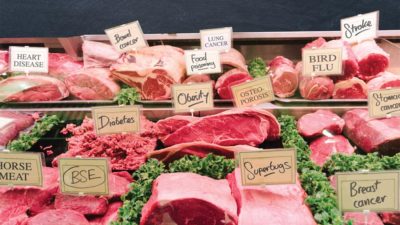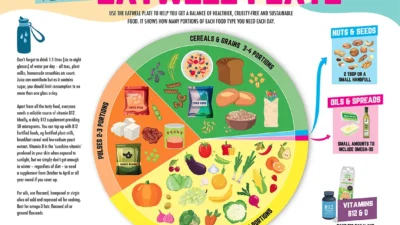Eat meat and ignore the science – outdated advice endangers health and the environment

Summary
Vegans are being warned that meat alternatives do not contain the essential nutrients found in meat and so cannot be used to replace it, according to some recent news stories. The report on which they are based is the latest from the Food and Agriculture Organisation (FAO) of the United Nations but seems completely out of step with previous reports from them (FAO, 2023). It is part-funded by the International Livestock Research Institute, with a scientific advisory committee reading like a who’s who in animal agriculture research. The report is a ‘narrative review’, which could be argued is more of an opinion piece and considers various aspects of diet including nutritional intakes, disease risks, public health issues and touches on environmental issues. Although they looked at over 500 studies, their focus supports a pro-meat agenda, with little or no attention given to the huge body of evidence supporting plant-based diets – for human health and environmental benefits. It’s not a balanced view by any means and should not be taken as such.
Misleading messages on nutrients
The FAO report describes one study comparing nutrient intakes in people eating plant-based meat alternatives compared to meat and says that those eating the substitutes fell short on vitamin B12, zinc, calcium, potassium and magnesium (Tso and Forde, 2021). They did not say how this study also found that a traditional vegan diet, high in pulses, nuts, seeds and wholegrains, was the highest for iron and fibre and higher in potassium and magnesium than the meat diet. Selecting only the evidence that suits your agenda is called cherry-picking.
Getting the balance right
Many studies show that vegans tend to have higher intakes of polyunsaturated (healthy) fatty acids, fibre, vitamins C and E, folate and some minerals while meat-eaters tend to have higher intakes of protein and some other vitamins and minerals, they also tend to have the highest intake of unhealthy saturated fat which contributes to their higher risk of disease. A well-planned vegan diet, with a reliable source of vitamins B12 and D, can provide all the nutrients you need while lowering the risk of all the major killer diseases. Read what major health bodies around the world say here.
Ironing out the facts
The FAO report says there is compelling evidence that a meat intake of 85 to 300 grams a day can protect adults against iron deficiency. But if you currently eat more than 90 grams of red or processed meat a day, the UK Department of Health and Social Care advises you to cut down to 70 grams due to the increased risk of bowel cancer. Encouraging high meat consumption is irresponsible and research shows, you don’t need meat for iron; one of the largest studies ever conducted on vegetarians and vegans, the European Prospective Investigation into Cancer and Nutrition (EPIC) Oxford study, compared the diets of over 18,000 meat-eaters, 4,500 fish-eaters, 6,600 vegetarians and 800 vegans and found vegans had the highest intake of iron and meat-eaters, the lowest (Sobiecki et al. 2016).
Questioning processed meat as a cause of cancer
The links between meat and cancer are described but somewhat downplayed in parts of the FAO report with comments such as: “High intake of red and processed meat and of animal saturated fats may induce deleterious effects.” That’s the first time we’ve heard cancer being called a “deleterious effect”.
They describe how in 2015, the International Agency for Research on Cancer (a specialised agency of the World Health Organisation or WHO) classified the consumption of red meat as “probably carcinogenic to humans” and processed meat as “carcinogenic to humans”. The latter is classed as a Group 1 carcinogen (WHO, 2015). The FAO report says: “Subsequent analyses have questioned the validity of these conclusions” showing a reckless disregard for the strength of evidence linking meat and cancer – especially processed meats such as sausages, bacon, salami, chicken nuggets and sliced lunch meats or cold cuts. This link is internationally recognised by all major health organisations including the World Cancer Research Fund (WCRF), Cancer Research UK, The American Institute for Cancer Research, the European Food Safety Authority (EFSA) etc. Those questioning the link tend to be representatives of the meat industry.
Double standards
Cultured meats offer the opportunity of meat production without the devastating environmental impacts of livestock farming. However, the report suggests nutrient uptake from growth medium may be inefficient, which is a bit rich given the staggeringly inefficient rate of conversion of animal feed crops into meat and dairy foods. For example, producing one kilogram of beef requires 25 kilograms of feed crops – with only 3.8 per cent of the protein content and 1.9 per cent of the calories of the feed crops converted to beef (Harwatt et al. 2022).
Wasting resources
Meat, fish, dairy and egg production use around 80 per cent of global farmland and produce 60 per cent of food’s greenhouse gas emissions but provide just 18 per cent of the calories we eat and 37 per cent of the protein (Poore and Nemecek, 2018). Growing food exclusively for people to eat, rather than feeding it to farmed animals, could feed an additional four billion people, that’s a total of 12 billion, with less damage to the environment.
Ignoring the pig in the room
The report warns that cultured meat could be at risk of contamination with food-borne pathogens – but this is not balanced against the increasing pandemic risk posed by factory farming animals, not to mention the rising number of antibiotic-resistant superbugs resulting from intensive animal agriculture.
Keeping up with the technology
They say: “The most efficient and widely used medium is derived from bovine blood.” They are referring to foetal bovine serum (FBS) and it is as cruel as it sounds, but most cultured meat producers moved on from using that years ago. Mosa Meat, who introduced the first lab-grown burger in 2013, announced in 2019 that they had removed FBS from their medium, and in 2020, Didier Toubia, co-founder and CEO of Aleph Farms, told Viva! that they did not use it either and most cultured meat companies are following suit. This year it was announced that global food tech company Good Meat (Eat Just’s cell-cultured meat group), will be scaling up production after its FBS-free media gained regulatory approval by the Singapore Food Agency. They will be building what is believed to be single largest bioreactor for use in the manufacture of cell-based meat and are on track to reach price parity with conventional meat by 2027. It’s not surprising the meat industry is on the back foot!
Bad science
The FAO report cites a handful of studies looking at the nutritional content of meat alternatives compared to meat. One of which, funded by The Beef Checkoff, Denver, CO and the National Pork Checkoff, Clive, IA – meat industry bodies whose aim is to increase demand – compared the nutritional content of ground pork with the following commercially produced plant-based burgers Beyond Meat Burger, Impossible Foods Burger and Morning Star’s Black Bean Burger (Swing et al. 2021). The burgers of course contained added salt, as do commercially produced meat burgers, so they were not comparing like-for-like but still concluded that the plant-based burgers contain more salt than ground pork! This type of analysis fails what I call ‘the sniff test’ – it is bad science.
Ignoring relevant studies
The FAO report says: “Few experimental trials have examined the impacts of TASF [terrestrial animal source food] alternatives on human health” then ignores one study that did exactly that, looking at the health effects of plant-based mince, burgers, sausages and meatballs from the Meatless Farm, a brand commercially available in the UK (Toribio-Mateas et al., 2021). Compared to those eating red meat, poultry, fish, eggs and cheese, in just four weeks, those eating the plant-based alternatives experienced positive changes in their gut bacteria that may confer significant and wide-ranging health benefits. Viva! do not recommend eating lots of processed foods, but it’s noteworthy that those containing high-quality ingredients can promote beneficial health effects.
Downplaying hazardous compounds
Many of the findings and key messages in the FAO report are at odds with the headlines. They describe how higher levels of the harmful compound trimethylamine N-oxide (TMAO) are found in meat-eaters compared to vegans, and list some of the detrimental health effects including cardiovascular events, diabetes, chronic kidney disease, fatty liver disease and obesity as well as all-cause mortality. Basically, you don’t want high levels of this compound circulating in your body and vegans have considerably lower levels than meat-eaters.
Missing the potential pandemic point
Zoonotic diseases (that come from animals) are discussed, with a brief mention of SARS, MERS, Ebola and avian influenza but again, the report misses the point, focusing only on wet markets in China and meat from wild animals in Africa with no mention of factory farming or the 2009 swine flu pandemic that arose from the international trading of live pigs. Scientists have been warning us for years that the next pandemic could come from a factory farm (Dhont et al., 2021).
Environmental links questioned
In the midst of a climate crisis, with animal agriculture contributing a fifth of all greenhouse gas emissions (Xu et al., 2021) and being the primary driver of biodiversity loss (Machovina et al., 2015) it is astonishing that this report questions the lower environmental impacts of plant-based meat alternatives. A wealth of evidence shows animal-based foods are by far the most damaging in terms of land use, water use, pollution, deforestation, eutrophication (dead zones in water resulting from the runoff of excess nutrients from farms) and loss of biodiversity. This is summarised in Viva!’s new fully referenced guide Vegan for the Planet.
Biodiversity backwards
When discussing biodiversity, the report says: “Livestock include a diverse range of species and breeds raised in a variety of production systems.” Implying a positive role for livestock in global biodiversity is like suggesting cigarettes are good for your health! By weight, 96 per cent of mammals on the planet are made up of livestock and humans and just four per cent are wild creatures. The imbalance of life on Earth is a tragedy, with wild animals being pushed toward extinction at 1,000 times the natural rate largely because of the demand for meat and dairy.
Outdated and regressive
With quotes such as: “Livestock are essential components of agroecosystems” and “Livestock play a crucial role in enhancing the food security and nutrition of the public at large” it is clear that this report is taking an outdated and regressive stance supporting the status quo as it stands. A business-as-usual approach will only perpetuate the detrimental health effects and disastrous environmental impacts the rising global demand for meat and dairy is having on the planet.
A flawed argument
In summary, this report reads like a briefing for a student debate where one side of a panel has been instructed to present an argument opposing plant-based meat alternatives in favour of animal-based foods. They may have looked at 500 studies, but this is not an impartial review of the evidence. It seems like they want to convince everyone that animal products contain nutrients – we know that but that doesn’t mean they are the best sources.
Viva! bringing you the scientific consensus
Viva! have been reviewing research on diet and health for nearly 30 years and have reviewed thousands of studies and without doubt, the consensus is that reducing or avoiding meat is better for your health and the environment. This is the view shared by all major health bodies, including the FAO, who previously said in their Sustainable Healthy Diets report: “Studies of food and health relationships have consistently highlighted associations between low intakes of plant-based foods as well as high intakes of animal products and ultra-processed foods, and poor health outcomes.” They go on to say: “The evidence compiled so far points to the combined health and environmental benefits of shifting towards a more plant-based diet, including vegetables and fruits, nuts, pulses and whole grains” (FAO and WHO, 2019).
This new FAO report, supporting meat and dairy, does not fit with the scientific consensus and should be disregarded.
References
- Dhont K, Piazza J and Hodson G. 2021. The role of meat appetite in willfully disregarding factory farming as a pandemic catalyst risk. Appetite. 164, 105279.
- FAO. 2023. Contribution of terrestrial animal source food to healthy diets for improved nutrition and health outcomes – An evidence and policy overview on the state of knowledge and gaps. Rome, FAO. https://doi.org/10.4060/cc3912en
- FAO and WHO. 2019. Sustainable healthy diets – Guiding principles. Rome
- Harwatt H, Wetterberg K, Giritharan A et al. 2022. Aligning food systems with climate and biodiversity targets – assessing the suitability of policy action over the next decade. https://www.chathamhouse.org/sites/default/files/2022-10/2022-10-14-food-systems-climate-biodiversity-harwatt-et-al.pdf
- Machovina B, Feeley KJ and Ripple WJ. 2015. Biodiversity conservation: The key is reducing meat consumption. Science of the Total Environment. 536, 419-431.
- Poore J and Nemecek T. 2018. Reducing food’s environmental impacts through producers and consumers. Science. 360 (6392) 987-992.
- Sobiecki JG, Appleby PN, Bradbury KE et al. 2016. High compliance with dietary recommendations in a cohort of meat eaters, fish eaters, vegetarians, and vegans: results from the European Prospective Investigation into Cancer and Nutrition-Oxford study. Nutrition Reviews. 36 (5) 464-77.
- Swing CJ, Thompson TW, Guimaraes O et al. 2021. Nutritional composition of novel plant-based meat alternatives and traditional animal-based meats. Journal of Food Science and Nutrition. 7, 109.
- Toribio-Mateas MA, Bester A and Klimenko N. 2021. Impact of Plant-Based Meat Alternatives on the Gut Microbiota of Consumers: A Real-World Study. Foods. 10 (9)2040.
- Tso and Forde. 2021. Unintended Consequences: Nutritional Impact and Potential Pitfalls of Switching from Animal- to Plant-Based Foods. Nutrients. 13 (8) 2527.
- WHO. 2015. Cancer: Carcinogenicity of the consumption of red meat and processed meat. https://www.who.int/news-room/questions-and-answers/item/cancer-carcinogenicity-of-the-consumption-of-red-meat-and-processed-meat
- Xu X, Sharma P, Shu S et al. 2021. Global greenhouse gas emissions from animal-based foods are twice those of plant-based foods. Nat Food. 2 (9) 724-732.






